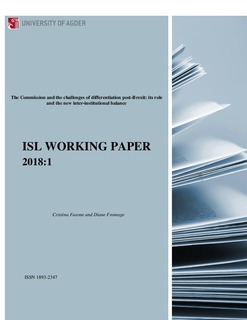| dc.description.abstract | Over the last few years the process of European integration has been challenged by several crises. The prompt responses given to them often led the governments of the Member States rather than by EU institutions to take the lead, as for the political directions the integration should follow especially. Those unprecedented crises, and amongst them certainly is Brexit, have for the first time, to such a great extent, put on the table the question of differentiation within the EU, between Eurozone and non-Eurozone countries and, relatedly, between debtor and creditor countries; between Member States that favour more collaboration on the side of migration and the system of migration quotas and those refusing it; between exiting and remaining in the EU.
Who can (and arguably should) lead the EU in the hard times of the quests for more differentiation and, as some argue, in coping with the threat of disintegration? Could the European Commission play this role, in the post-Brexit context, as it did in previous stages of the process of integration and if so, how?
Drawing on the Commission’s White Paper on the future of Europe and its 5 scenarios for the EU 27 – “Carrying on”, “Nothing but the single market”, “Those who want more do more”, “Doing less more efficiently”, “Doing much more together” – the paper focuses on the role the Commission could play under the scenario of an increased differentiated integration within the EU-post Brexit. On the basis of the role fulfilled by the Commission over the first 60 years of European integration, the paper deals first with the potential the Commission has to cope with the challenge of differentiation. It then assesses what the effects of a leading role of the Commission would be on the interinstitutional balance within the EU. | nb_NO |
